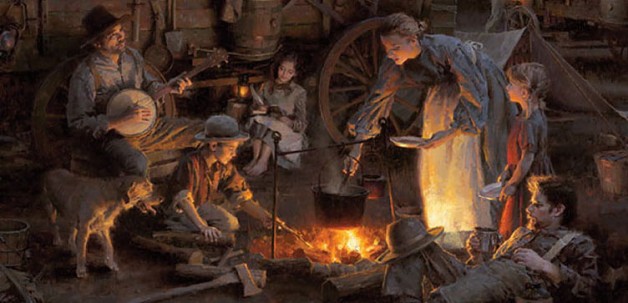What’s the value of a virtue-based account of the Christian moral life? Why complicate morality with complex considerations of human nature and abstruse ideas like grace and happiness? Can’t we just find out the rules and follow them?
That won’t do, because Christian perfection as portrayed in the Beatitudes and life of Christ isn’t just a technique of rules. The funny thing about rules is that it’s pretty easy to come up with a strategy that avoids breaking them, yet still misses the point. Instead of an abstract proof, allow me to illustrate with an example.
Many readers will fondly remember a famous educational computer game by the name of Oregon Trail that was used in many grade schools. For those who don’t, it’s designed to teach kids about frontier life by letting them assume the role of a band of pioneers in 1848 heading out west in covered wagons. The players must decide when to start, what supplies to buy, which route to take, and more. The computer simulates the journey, imposing the constraints of terrain and human endurance and contingent events like weather, illness, and the availability of animals to hunt for food. All this made for one of the most genuinely engaging educational computer games ever made.
I went through two very different phases playing this game. At first, my friends and I played it exactly as though we were the people on the journey. We entered our own names as the names of the characters. We played together, making in-game decisions by consensus (among those whose characters had not died of cholera or typhoid or whatever) and at the end we would assess our game in terms of how well we thought our characters would do as settlers in Oregon. In short, what we cared about was the reality that the game was made to simulate: the pioneer life. Despite its limitations, it was a quite effective way to involve us in the history of that time.
But then we found a different way to play. Being competitive, we couldn’t ignore the fact that the computer gave you a score in points. Getting to Oregon with everyone alive and in good health earned you the bulk of your points, but possessing useful items at the end increased your score still more. If you took on the challenge of starting the game with less money, you were awarded bigger bonuses at the end. Theoretically, the point total should have been a good indicator of the quality of your performance in the game.
But as I began to play the game for points, a subtle yet significant shift occurred. The first thing to go was attention to the health of the characters. As long as they didn’t die, the only thing that mattered was that their health was “good” right at the final moment when points were awarded. Since this made paying attention to those distressing messages like “Johnny has a broken arm” a waste of time, I started naming the party members things like “Player1,” “Zqfmgb,” or “Darth Vader” so that I wouldn’t be tempted to care. When I noticed that clothes weren’t worth many points or critical for survival, I stopped buying them and used the money to stock up on higher-scoring items. Eventually I got to the point where nothing was too absurd, as long as it earned more points—never mind what a distortion this was of the reality of actual 19th-century covered wagon journeys.
These strategies yielded impressively high scores. I reached as high as 8,109. Yet I had evaded the actual point of the game. Pragmatically focusing on maximizing the outward sign of success, I had become almost entirely disengaged from the reality of what success meant in the life of those pioneers.
Is it possible for us to “play for points” in the moral life? It is, and it’s called “moralism.” When we focus on exterior actions while ignoring or despising the underlying realities of human nature and divine grace, we end up putting the cart before the horse (or the wagon before the ox?). Moralism might not be as obviously bad as a wicked life, but it won’t foster our true happiness or human flourishing any more than 8,109 points met poor Zqfmgb’s need for clothes or a splint on his arm. The Christian life will make us happy and attract others to Christ—but only if we let its transforming power work not just on what we do but on who we are. That is what St. Thomas Aquinas’ virtue ethics is all about. In it we have a Scriptural, Patristic alternative to moralism.
✠
Image: Morgan Weistling, Oregon Trail Family, 1848







